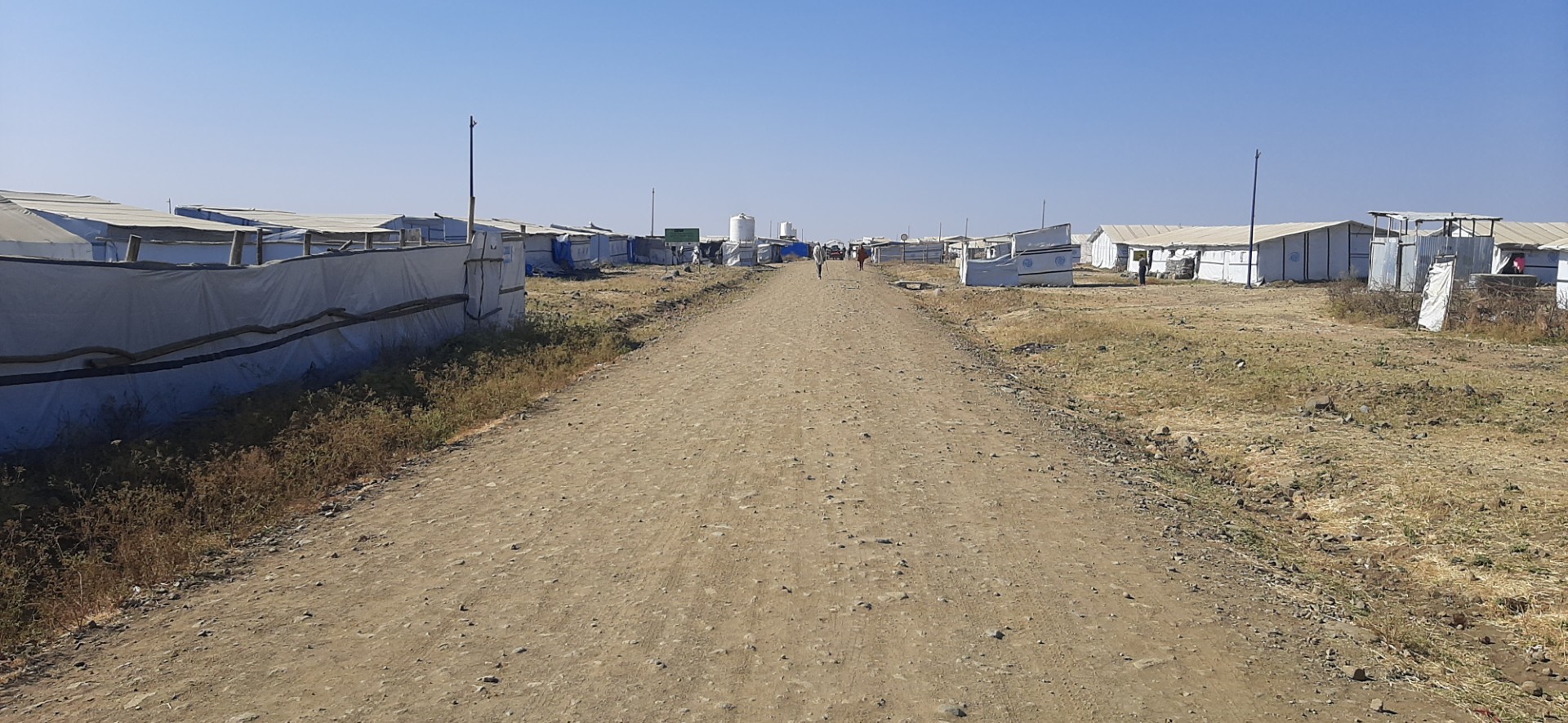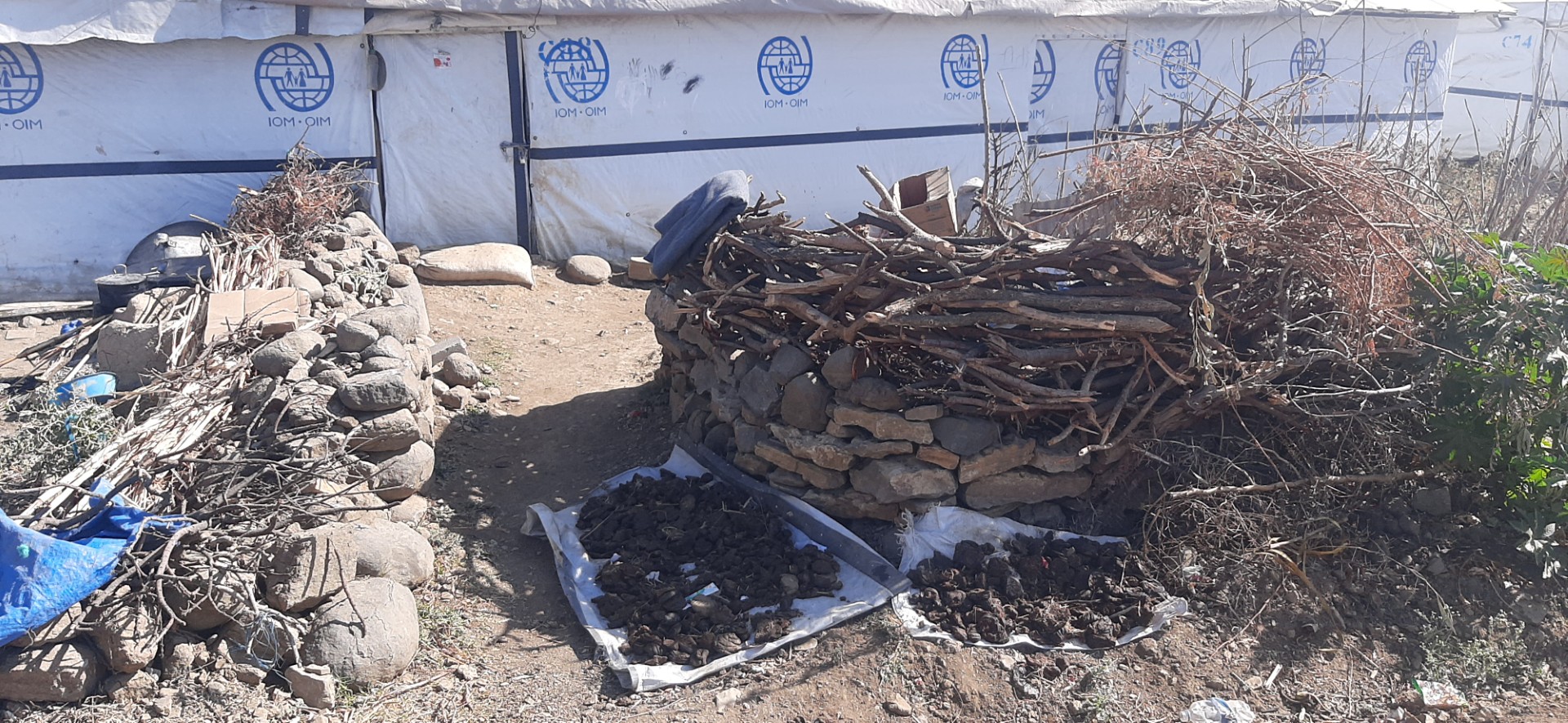In this section
In this sectionThe United Nations estimates that over one million people remain internally displaced due to the Tigray conflict and seek refuge in camps across the region. Given the ongoing security concerns which hinder the return efforts, especially in the Western and Northeastern regions of Tigray, internally displaced persons (IDPs) currently residing in cities such as Mekelle, Shire, Abiy-Adi, and Adigrat endure distressing conditions with limited humanitarian aid.
In December 2023, I visited Seba Kare (70 Kare) IDP camp, one of the largest IDP sites in the region. Situated about five kilometres to the west of Mekelle, the capital city of the Tigray region, Seba Kare IDP camp is home to around 12,000 IDPs, most of whom fled from the Western, Southwestern, and Eastern parts of the region according to IOM.

The main gate at Seba Kare IDP camp, Mekelle, Tigray. © Awetehagn Tuaum Gebremariam/UNITAR/GPA
I spoke with an international non-governmental organisation (INGO) representative regarding energy usage in the IDP camp. It was disheartening to learn that, despite its proximity to the city and the substantial number of households it hosts, the camp depends solely on household solar lanterns, which are not sufficient for lighting and are primarily sourced by individual households, while people rely mostly on firewood and charcoal to cook. This raises questions as to why the camp remains disconnected from the national electricity grid, especially considering its adjacency to the region's largest industrial park, which enjoys grid connectivity.
Surprisingly, most INGOs and local NGOs do not prioritise energy-related initiatives despite this being a persistent issue discussed in cluster meetings. An INGO representative lamented the absence of viable solutions and the lack of concerted efforts through NGO involvement to resolve the energy crisis. Although UNHCR has installed solar streetlights, they were not operational at the time.
In the IDP camp I encountered a woman preparing lunch outside her tarpaulin shelter. Engaging in conversation, we discussed the challenges related to energy access within the camp. She told me that although solar lanterns are the main source of lighting, some people also use kerosene lamps and candles as solar lanterns are insufficient to meet their lighting needs. The most pressing concern, she emphasised, is the energy required for cooking and baking injera, predominantly firewood and charcoal.

Twigs, firewood, and animal dung at Seba Kare IDP camp. © Awetehagn Tuaum Gebremariam/UNITAR/GPA
The majority of households rely on traditional cooking methods and use a three-stone stove for cooking and a handmade circular griddle, commonly referred to as a 'Mogogo', for baking injera. Additionally, some households use a locally-crafted portable circular metal stove called a ‘Moqlo-Hatsin’. They also use a locally crafted rectangular metal for charcoal-based cooking referred to as 'Fernelo' for cooking and making coffee.
Firewood is available at inflated prices from the market: often the sale of aid rations received from NGOs becomes necessary to afford firewood as no assistance is provided specifically for cooking energy needs. Families residing in IDP camps persevere to access alternative sources of energy for cooking and they often rely on animal dung, provided by host communities, which they dry and use as a substitute for firewood when cooking and baking injera. However, acquiring this dung can be difficult, as host communities sometimes refuse to provide it as they use it as compost for farming. In such instances, IDP families resort to collecting twigs and plastics from nearby areas and the surrounding city to meet their energy needs.
When unable to afford fuel, people resort to forbidden methods such as scavenging from nearby land owned by the host community or government. This can result in injury, sexual violence, and abuse. Recounting her own experience, the woman told me she had been apprehended twice while collecting firewood from restricted areas. Tragically, her daughter fell victim to sexual violence and abuse during similar excursions, while her son faced harassment and detainment. This underscores the multifaceted challenges faced by displaced communities, not only in securing necessities like energy but also in navigating dangerous circumstances to meet their essential needs.
I was struck by the profound trauma experienced by many of the women in the IDP camp as a result of the Tigray conflict. They have endured harrowing experiences such as sexual assault, the loss of loved ones during the conflict, and witnessing the horrors of war first-hand. Consequently, they are grappling with severe psychological distress. Compounding this trauma are the ongoing challenges related to energy access, particularly the scarcity of firewood and charcoal essential for cooking and baking injera. This exacerbates the difficulties of daily life for these already vulnerable individuals.
Considering these pressing issues, urgent action is needed from the numerous NGOs operating within the IDP camp. Surveys have highlighted energy provision as the second most critical need in the camp, following closely behind food aid. These organisations should respond promptly to alleviate the suffering of those affected by the conflict, providing essential support to address both the psychological trauma and energy-related challenges they face.
Moreover, collaborating with community members to co-design interventions can yield effective solutions tailored to the specific needs of those affected. This approach allows government entities, humanitarian organisations, and other stakeholders to gain invaluable insights into tackling energy challenges within displacement contexts, while also acknowledging the resourcefulness shown by IDP households in crafting their cooking methods with indigenous knowledge and experience.
The article is written by Awetehagn Tuaum Gebremariam, Research Associate at UNITAR/GPA. Learn more about the READS Programme here.
Last updated: 08/11/2024


